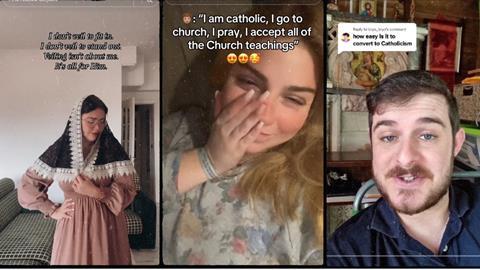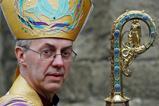Samantha Smith’s return to the faith of her childhood was, in part, encouraged by the traditional Catholic influencers she found online. She explores why young people are drawn to them

To most, the idea of ‘traditional’ Catholicism evokes images of ornate cathedrals, Latin Mass and rigid orthodoxy. But for Generation Z, the dawn of social media has heralded a new age of Christian influencers who preach to and convert their followers through the white light of a phone screen instead.
The presence of digital technology is a reality of modern life. The constant stream of algorithmised content being spoon-fed to us through Instagram, Facebook and TikTok precipitates the existence of online subcultures catering to every niche interest imaginable.
As a Gen Z Catholic, I can attest to the unique popularity and dominance of the #TradCath trend.
Brought back to faith
Being from an Afro-Hispanic and Filipino background, I was raised a strict Roman Catholic. We attended church twice a week (even more during the school holidays), prayed to God every night before bed, sang in the choir and volunteered at every possible service and event. My favourite book for at least four years was my copy of The Children’s Bible.
Catholic influencers are growing audiences in the hundreds of thousands
Yet despite my upbringing, as a teen, I found myself drifting from my faith. Personal traumas led me to stop actively participating in Roman Catholicism, and the apparent abandonment of traditional Christian doctrine by other denominations (hint: the Church of England) left me disillusioned by organised religion.
Eventually, I found my way back – and a large motivator was seeing other young people online sharing their lives and faiths. There, I found a conservative theological perspective on modern issues that I had otherwise felt isolated in.
Counter-cultural Christianity
Many people assume that Gen Z aspires to the lifestyle of Love Islanders, TikTok stars or other online micro-celebrities. Yet, Catholic influencers are growing audiences in the hundreds of thousands, creating content which appears to be entirely opposed to what young people ‘should’ like.
It seems counter-intuitive that this generation would be drawn to an institution as traditional and hierarchical as the Church. Yet, despite a wider national shift towards agnosticism, weekly attendance at Church of England services among under-16s has increased by nearly six per cent in the past year.
Online influencers make complex theological concepts accessible to young people in short, simplified segments
The owner of a Catholic clothing company reported that sales of lace mantillas had doubled since the popularisation of TikTok in 2019, with many customers being young women and their husbands. Curated collages of orthodox iconography and videos depicting the #TradCath ‘lifestyle’ garner millions of likes and shares across various social media platforms.
A return to traditional values
Gen Z was raised against a backdrop of perma-conflict: the deadly Covid-19 pandemic, the toxicity of Western political debate, countless global conflicts and a thirst for catastrophe that pervades all areas of society. Perhaps, therefore, it is natural that depictions of attractive women in modest clothing, or homesteads filled with children and farm animals would evoke a desire for the ideals of a bygone era.
Just as their own parents raged against the machine, many Gen Z-ers are rejecting the looseness and moral flexibility of modern society, taking up the pro-life cause and remaining celibate.
Just as older generations sought divine instruction from a priest in the pulpit, online influencers make complex theological concepts accessible to young people in short, simplified segments.
Just as some were raised on Sunday Mass and a My First Bible, online discussions of Catholicism promise enlightenment and fellowship to those who strayed from – or never belonged to – an organised religion.
Against an increasingly secular landscape, where conservative social values are shunned in favour of hyper-individualism and progressive political doctrine, it appears that traditional Catholicism has become a beacon of cultural defiance.





































No comments yet